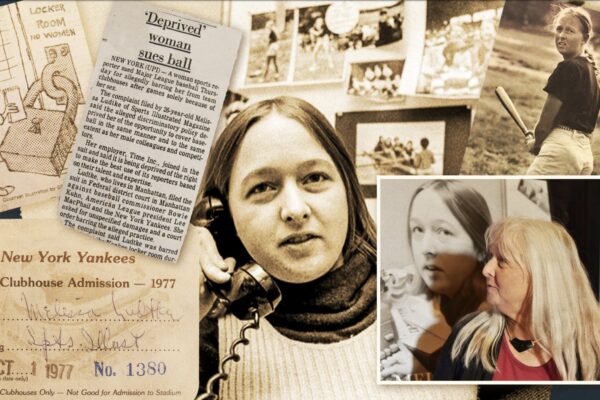By Chris Schumerth | @ChrisSchumerth
Sports Capital Journalism Program
NEW ORLEANS – Not too long ago the prospect of Notre Dame playing in a College Football Playoff Quarterfinal appeared to be the stuff of fantasy.
Look no further than the Week 2 loss at home to Northern Illinois and the role played by quarterback Riley Leonard, the Duke transfer head coach Marcus Freeman stuck with when Leonard wasn’t exactly at the height of popularity in South Bend.
With just over six minutes to go and the Irish clinging to a 1-point lead over NIU, Leonard launched a deep shot toward Florida International transfer Kris Mitchell into double coverage, a pass that was underthrown and picked off. The interception had led to the Huskies’ game-winning drive and field goal.
In one shocking outcome, Notre Dame went from a perceived lock for one of the 12 playoff slots after beating Texas A&M in the opener to a program with more questions than answers.
Over time, Notre Dame’s stumble would become a point of reference in a season of national championship possibilities.
“I think the biggest thing is not caring what people think,” Leonard said, looking back. “Once you lose a game like that, you can’t say any worse things and people can’t think many worse things about you, so you got nothing to do but respond…and play freely.”
Senior defensive lineman Gabriel Rubio, whose role is expected to expand after the injury to Rylie Mills, reflected on the lessons learned. “A big thing was we hadn’t yet learned how to handle success as a group,” said Rubio, who didn’t contribute much until the second half of the season. “Our group…as far as transfers, new guys, like us being together as a team…and going into A&M and taking down an SEC team like that and one of the hardest places to play in and then coming back the next week and feeling like we had, you know, a chip on our shoulder for a second. We got a little comfortable…a little bit lackadaisical just because of the success.”
The Purdue game would then prove to be cathartic for an Irish squad determined to redeem itself. But if anything, the wins against Miami of Ohio and Louisville probably confirmed Notre Dame’s vulnerability at that point of the season.
“It’s a constant improvement,” Freeman explained. “There were some issues and mistakes that we made in week one versus A&M that were probably masked to the outside by the outcome of the game. And they were obviously magnified the following week because of the outcome of the game. And what we have to do is continuously improve.”
To listen to All-American safety Xavier Watts, Freeman’s message sunk in. “(Freeman’s) our leader and the message he related to us…obviously, our season wasn’t over,” Watts said. “But we had so many more games left…so we could have went downhill or continue to improve.”
And once the lesson was learned? Notre Dame started mowing down opponents. With the possible exception of a USC team that Notre Dame beat in an uncharacteristic shoot-out, the opponent almost didn’t matter. For most of the second half of its season, Notre Dame was dominant; at times the Irish looked unbeatable.
Strength of schedule would become an issue as the Irish climbed back into the top 10 and earned a No. 7 seed and first-round game against Indiana.
The lessons learned could soon determine whether the Irish can restore a link to their championship past, because the challenge of facing Georgia will be different.
Though the Bulldogs will be playing with backup quarterback Gunner Stockton at the helm, this is a program that won the Southeastern Conference championship, that won two of the past three national championships, that beat Texas twice, that trailed 30-7 at Alabama and still took the lead in the fourth quarter before losing by a touchdown.
Notre Dame has played Georgia just three times in its football-playing history, with two of those being in the past decade with an average margin of 3.5 points. The first meeting was in the 1981 Sugar Bowl. The Irish lost all three games.
Notre Dame has won one consensus national championship in the last 46 seasons. Of the school’s 11 consensus national titles, just three required bowl victories – the Sugar Bowl after the 1973 season, the Cotton Bowl after the 1977 season and the Fiesta Bowl after the 1988 season. Notre Dame’s last victory in a major bowl was over Texas A&M in the 1994 Cotton Bowl.
A game of this magnitude is surely comparable to a national championship appearance against Alabama in 2012 or playoff appearances against Clemson in 2019 and Alabama in 2021.
The conclusion reached outside the Fighting Irish locker room after each of those games was that Notre Dame is no longer among college football’s elite.
Freeman doesn’t buy the zero-sum thinking. “Listen, this is an opportunity for us to go and compete against one of the best teams in the country in the Allstate Sugar Bowl,” he said. “It’s a privilege. We’re grateful for the opportunity, and we’re going to prepare in a way that’s going to give this program the best chance to do that. But I don’t believe much in a ‘major bowl.’ I believe in the opportunity to go out there and compete and win with guys that prepare like heck with you.”
But will this be the one that’s different? Will Freeman’s Irish make the Brian Kelly era a distant memory sooner rather than later?
Like the Irish, the Bulldogs have had their moments—Kentucky, Ole Miss, Georgia Tech—where they’ve looked vulnerable this season, too.
Notre Dame sophomore running back Jeremiyah Love had his own thoughts about his team’s latest opportunity.
“They’re a great team,” Love said of the Bulldogs. “Going to be a challenge for us. We’re going to make it a challenge for them.”


